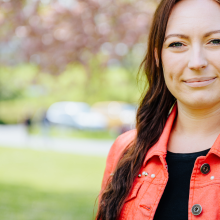Welcome to the page of the ChroNu Study

Dear Interested Parties
On this page, you will learn about the essential aspects of the first controlled nutrition study conducted by the University of Paderborn, the ChroNu Study. The background of our study is based on observations that show that it is not only important what we eat, but also when we eat, in relation to the development of obesity and diseases such as Type 2 Diabetes. In this context, it seems particularly problematic when people consume large amounts of unfavorable carbohydrates in the evening. Additionally, when a set daily schedule is imposed, such as through studies, it may be that people eat against their "internal clock": larks (early risers) may eat "too late," or owls (late risers) may eat "too early." In the ChroNu study, we aim to investigate whether "eating against the internal clock" has a negative impact on the metabolism, even in young adults.
To this end, during the past winter semester of 2019/2020, we identified larks and owls (through Screening Study 1), from which we then invited the earliest and latest chronotypes to participate in an 8-day nutrition study, which will begin in September 2020.
This study is part of a collaboration with the University of Bonn and the German Diabetes Center in Düsseldorf and is funded by the German Research Foundation (DFG).
You can participate if you
-
are studying at Paderborn University
-
are 18-25 years old
-
are normal or overweight (BMI >18.5 kg/m2 and <30 kg/m2)
-
understand and speak German (all questionnaires are in German)
Unfortunately, you cannot participate if you
-
are studying Nutrition Science GyGe
-
are pregnant or breastfeeding
-
regularly have to take medication such as anti-depressants, tranquillisers and sleeping pills (exception: contraceptives)
-
work in "shift work" or have travelled across more than 1 time zone in the last 3 months
In the screening, we wanted to find out whether you are an owl or a lark.
To this end, the students completed various questionnaires on their daily routine (general, diet, physical activity) and their body composition was determined. We would like to repeat this process in the summer semester of 2021 with the same participants (follow-up) in order to record any changes in chronotype and body composition.
Detailed information on the procedure of this study and on data protection can be found [here].
Controlled dietary study to determine the glucose response to morning and evening consumption of a meal rich in high glycaemic index carbohydrates in students with early and late chronotypes
If you have participated in Study 1 (screening) and we have determined that you are a typical lark or owl, we will contact you again and invite you to participate in Study 2 (controlled dietary study).
Our controlled diet study will start in September 2020 and will take place over 8 consecutive days.
In this study, we want to find out whether the glucose response to high glycaemic index carbohydrates consumed in the morning and evening differs between young adults with early and late chronotypes (larks and owls).
In the following, we would like to briefly describe how this study will proceed:
First, we would like to update our data about you and therefore ask you once again to fill out our questionnaires.
Procedure and measurements
During the course of the study, we will ask you to carry out the following measurements or have them carried out:
-
Determination of your activity and nocturnal rest phases on days 1 - 8 (accelerometry) using a sensor that you wear on your wrist
-
Continuous glucose measurement (on days 1 - 8) using a sensor that you wear on your stomach
-
Manual blood glucose measurement with a blood glucose meter (on days 1 - 8)
-
Fasting blood sample (on day 4)
-
Anthropometric measurements on day 4 and day 8
Furthermore, we ask you to keep an activity, sleep and nutrition diary during the intervention study (days 1 - 8).
Detailed information on the procedure of this study and on data protection can be found[here].
If you take part in the controlled nutrition study,
-
you will receive three main meals and two snacks from us on four days of the intervention study;
-
you will receive an evaluation of your activity and rest phases as an example for one day;
-
you will receive feedback on your glucose profile on 3 study days:
-
receive an expense allowance of 150 euros;
-
find out again the composition of your body (water, fat, muscle mass), which we determine using bioelectrical impedance analysis.
Publikationen
- Stutz B, Krueger B, Goletzke J, Jankovic N, Alexy U, Herder C, Dierkes J, Berg-Beckhoff B, Jakobsmeyer R, Reinsberger C, Buyken AE: Glycemic response to meals with a high glycemic index differs between morning and evening – a randomized cross-over controlled trial among students with early or late chronotype: Eur J Nutr 2024 63(5):1593-1604
- Stutz B, Goletzke J, Krueger B, Jankovic N, Alexy U, Herder C, Jakobsmeyer R, Reinsberger C, Buyken AE: Association between glucose dips and the feeling of hunger in a dietary intervention study among students with early and late chronotype – secondary analysis of a randomized cross-over nutrition trial. Appetite 2024 200:107569
- Krueger B, Stutz B, Jankovic N, Alexy U, Kilanowski A, Libuda L, Buyken AE: The association of chronotype and social jet lag with body composition in German students: The role of physical activity behaviour and the impact of the pandemic lockdown. PlosOne 2023 18(1):e0279620
- Stutz B, Buyken AE, Schadow AM Jankovic N, Alexy U, Krüger B: Associations of chronotype and social jetlag with eating jetlag and their changes among German students during the first COVID-19 lockdown. The Chronotype and Nutrition Study. Appetite 2023 180:106333




